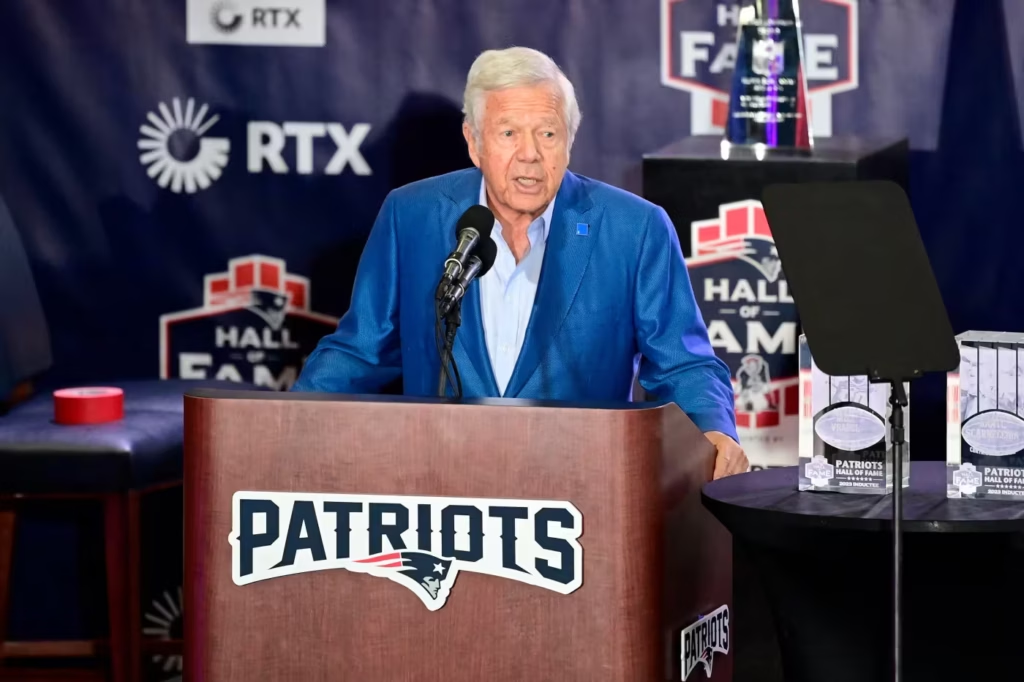In the wake of the Oct. 7 Hamas attacks that plunged Israel into war, New England Patriots owner Robert Kraft is matching a $100 million donation to his Foundation to Combat Antisemitism—giving the project $200 million in new funding that he says will sustain the cause for decades to come.
Kraft’s donation equals one made by the Norman R. Rales and Ruth Rales Foundation, and he says the donations will allow FCAS to significantly expand its operations with permanent financing.
“This is a foundation that can’t run for the next two to three years, it has to run for at least a couple decades,” Kraft says. “I’m not sure its work will ever be done.”
Kraft’s foundation has taken on a more prominent public profile over the last couple of years. It launched a “Stand Up to Jewish Hate” ad that ran during the last NFL season after a string of high-profile antisemitic incidents, such as comments by Kanye West. Earlier this year, the 82-year-old committed $25 million to broaden the campaign and educate the public about the rise in antisemitic incidents.
The commercials have included a small blue square, which represents the percentage of the Jewish population in the U.S., that grows larger to reflect the disproportionate number of religious hate crimes that target the Jewish community in the country. Since then, blue squares either tacked onto lapels or on social media have become a prevalent symbol of fighting antisemitism. The new influx of money, the foundation says, will allow it to reach even more people—on television, social media and even in-person.
Kraft says the foundation has already observed a sizable and quantifiable impact from its work: its internal research shows that the number of people who were willing to stand up and support Jewish people receiving acts of hate has gone from 20% of the population to 40%.
Joshua Rales, who runs his family’s foundation, says they were first spurred to take action after the 2018 shooting at the Tree of Life synagogue in Pittsburgh, where he grew up. His late grandparents had once fled persecution in Europe, and his father was raised in a Jewish orphanage in the U.S. before launching a successful business career.
Rales says they found an organization they could resonate with in the spring when they saw the foundation’s commercials that made him teary-eyed. That led to a series of meetings, where they grew to appreciate Kraft’s commitment for and FCAS’s data-driven approach to tackling the problem.
“Hate doesn’t stop with antisemitism,” Rales says. “Hate is greedy and tries to devour everything in its path, and it needs to be stopped. And that’s why we put up this kind of money because the amount of resources that are going to be needed to make the inroads and to bring people into the fold are going to be substantial.”
Kraft started the Foundation to Combat Antisemitism in 2019 in response to several incidents over the preceding years. In 2017, there was an infamous rally that turned violent in Charlottesville, Va., attended by white-nationalist and neo-Nazi groups. In 2018 and 2019, there were high-profile shootings at synagogues in Pittsburgh and Poway, Calif., respectively, in what authorities called hate crimes.
“Those three events had a real personal impact on me,” Kraft says.
Earlier this year, the Anti-Defamation League, a Jewish advocacy group that studies antisemitism, said that 2022 witnessed the most antisemitic incidents in the U.S. since it began tracking in 1979.
The situation became even more salient on Oct. 7, when Hamas militants invaded Israel over the Gaza border in an attack that Israeli officials say more than 1,200 people were killed. Hamas, a U.S.-designated terrorist group, is believed to still hold over 100 hostages. Authorities in Gaza have said more than 15,900 people have been killed in Israel’s subsequent campaign to root out the group and its leaders.
The two-month-old war has prompted concerns over both antisemitism and anti-Muslim acts both in the U.S. and across the globe. Kraft notes how recent commercials featured by the foundation have also called out the rise in hate against other groups—such as the Black, Muslim and Asian communities—and that he hopes the blue square can come to represent fighting other forms of hateful behavior.
“We want this to be a unifying symbol,” he says.

The war has particularly stoked tensions on college campuses, where waves of pro-Palestinian protests have sparked counterprotests and even instances of violence. Many top schools have faced results from donors who viewed their responses to Hamas’s attack as weak.
Kraft also indicated that also speaks to the foundation’s goal of educating people, young and old.
“We have so many young people organizing and supporting terrorist groups,” Kraft says.
Kraft adds that one the foundation’s goals in the coming months is to further develop the relationship between the Black and Jewish communities, a tie he says was “so powerful historically” but has frayed in recent years.
Earlier this year, Kraft was joined by the rapper Meek Mill at the annual March of the Living, which honors Holocaust victims, in Poland. Over the summer, Kraft and Meek Mill featured on a panel at the NAACP’s national convention.














